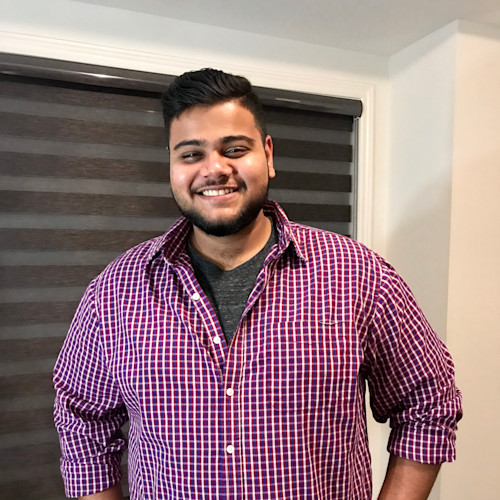
Shortly before attending Mangohacks, Akash remembers changing his major from biology to computer science. Having felt a bit overwhelmed by the suggested change, he leaned a club on campus called the Society of Competitive Programmers (SCP) at the University of South Florida. This club was where he had heard of hackathons and was inspired to attend one.
Having started as a cell and molecular biology major who changed their major to computer science purely on instinct and curiosity, Akash credits hackathons with his growth in the CS field. With no prior experience in it, he felt he was not ready for hackathons and might have quit his major early. Hackathons gave him an environment to feel like it was okay not to be the best, not to be ready, not to know something, but it’s never okay not to do something about it.
Hackathons gave Akash an environment not only to learn and have fun but also to make connections with potential recruiters and companies. These connections, sooner or later, pay off when the time comes to find a job or apply for grad schools. Akash says, “Attending hackathons is an experience which, in my opinion, sets you up for the world waiting for you once you graduate.”
Having come a long way since switching his major, Akash now finds himself as the president of SCP. He uses this position to provide comfort and support to those who, like him, felt overwhelmed and are new to the tech field.
He is currently a research assistant working in USF Graphics and Visualization Lab. Akash wants to pursue a PhD in CS after he graduates with a concentration in Data Science and Data Visualization. Hackathons have given him the opportunity to visit various universities and hopefully, he will be pursuing his PhD at one of those schools.
Akash’s favorite hackathon project was the one he worked on during Hack-a-Bull 2019 at USF. The project name was the Bullinator. It was an anti-bullying device primarily focused on detecting cases of bullying through speech recognition and identifying the bully and victim. It was not a perfect design or concept but had a working model and results which the team was proud of. They used Google Speech and voice recognition along with hardware like Qualcomm Snapdragon board kit and a mic. Akash liked the idea, the cause, and the concept they chose to work on. It gave him the inspiration to continue working on technology and come up with devices and solutions to tackle some of the social issues in his community.
Quick Facts

Shortly before attending Mangohacks, Akash remembers changing his major from biology to computer science. Having felt a bit overwhelmed by the suggested change, he leaned a club on campus called the Society of Competitive Programmers (SCP) at the University of South Florida. This club was where he had heard of hackathons and was inspired to attend one.
Having started as a cell and molecular biology major who changed their major to computer science purely on instinct and curiosity, Akash credits hackathons with his growth in the CS field. With no prior experience in it, he felt he was not ready for hackathons and might have quit his major early. Hackathons gave him an environment to feel like it was okay not to be the best, not to be ready, not to know something, but it’s never okay not to do something about it.
Hackathons gave Akash an environment not only to learn and have fun but also to make connections with potential recruiters and companies. These connections, sooner or later, pay off when the time comes to find a job or apply for grad schools. Akash says, “Attending hackathons is an experience which, in my opinion, sets you up for the world waiting for you once you graduate.”
Having come a long way since switching his major, Akash now finds himself as the president of SCP. He uses this position to provide comfort and support to those who, like him, felt overwhelmed and are new to the tech field.
He is currently a research assistant working in USF Graphics and Visualization Lab. Akash wants to pursue a PhD in CS after he graduates with a concentration in Data Science and Data Visualization. Hackathons have given him the opportunity to visit various universities and hopefully, he will be pursuing his PhD at one of those schools.
Akash’s favorite hackathon project was the one he worked on during Hack-a-Bull 2019 at USF. The project name was the Bullinator. It was an anti-bullying device primarily focused on detecting cases of bullying through speech recognition and identifying the bully and victim. It was not a perfect design or concept but had a working model and results which the team was proud of. They used Google Speech and voice recognition along with hardware like Qualcomm Snapdragon board kit and a mic. Akash liked the idea, the cause, and the concept they chose to work on. It gave him the inspiration to continue working on technology and come up with devices and solutions to tackle some of the social issues in his community.



